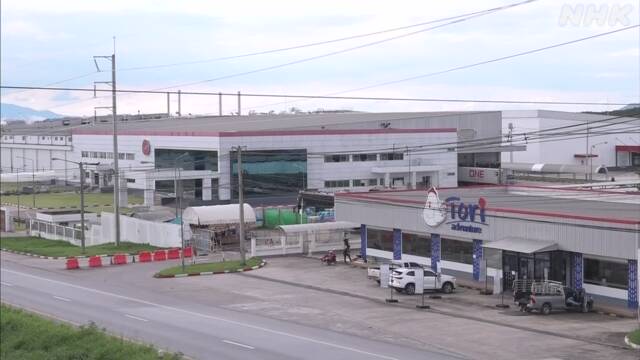The spread of the new coronavirus infection in Southeast Asia is affecting domestic sales of chicken.
As a result of the suspension of factory operations in Thailand, where chicken production is active, product supply is in short supply and import prices are rising.
Nichirei Foods, a food manufacturer, temporarily suspended operations at a food processing factory in Thailand due to labor shortages such as the spread of infection in Southeast Asia that prevented employees from neighboring countries from entering the country.
Although it is currently resuming, the production system continues to shrink from normal, so there is a possibility that sales of some frozen chicken fried chicken products manufactured in Thailand will be stopped in the future. There is.
In addition, because Nippon Suisan Kaisha had a labor shortage due to the spread of infection and the operation of the contractor's production line in Thailand was restricted, the sale of frozen chicken meatballs scheduled for last month was postponed, and Ajinomoto frozen foods The supply of frozen chicken meat shipped from factories in Thailand is less than initially expected, and it is running out of stock at supermarkets in Japan.
Export of Thai processed chicken to Japan drops sharply
In August, the number of new coronavirus infections per day in Thailand temporarily exceeded 20,000, and the infection spread rapidly, causing employee infections and labor shortages at factories, and production stopped. And the decline in operations led to a decrease in exports.
Infections have been confirmed in more than 150 places in Thai food factories since April.
According to the Ministry of Agriculture, Forestry and Fisheries' Ministry of Agriculture, Forestry and Fisheries Import and Export Overview, Japan imports about 500,000 tons of chicken processed for yakitori and fried chicken every year, and the amount is about 250 billion yen, of which Thailand is about 6 It is the largest import partner, accounting for a percentage.
However, according to the Thai Ministry of Commerce, exports of processed chicken to Japan fell sharply in August, down 29% on a monetary basis compared to the same month last year.
Import prices rise
The impact of the spread of infection in major production areas is also reflected in the import price, and according to the Agriculture and Livestock Industries Corporation, the price of frozen young chickens imported into Japan for household and commercial use is per kilogram. This year, it was 207 yen in April, but it increased to 230 yen in August, which is a 12% increase compared to the same month of the previous year.
As for the future supply and demand outlook for chicken, this month's imports are expected to decline significantly from the same month of the previous year, with supply from Thailand and Brazil expected to decline.
As a result, inventories at the end of this month, including domestic ones, are projected to be significantly below the same month of the previous year, well below the average for the past five years, by more than 17%.
Market officials said, "Production of chicken products at Thai factories seems to be still stagnant due to the spread of the new corona infection. Imported goods inventory is also on a downward trend, and in the future, import volume and price will be affected. There are concerns about further impact on domestic transactions. "
Switching to purchases from supermarkets in Tokyo and China
At supermarkets in Tokyo, the selection of chicken-based products is affected.
At supermarkets in Nerima Ward, Tokyo, it has become difficult to procure processed products such as chicken thighs and meatballs from Thailand since last month, and some products have begun to be unable to secure the required amount.
Also, every year, we purchase roast chicken from Thailand for the Christmas sales season at the end of the year, but when we ordered 500 chickens from a wholesale company, "local production was delayed and it became unclear how much we could secure. It means that there was a notice of discontinuation of sales.
For this reason, we are urgently forced to switch to purchasing from the United States and China, which we have not handled before.
In addition, as Thai products are running out of stock, the purchase price of Brazilian products has risen significantly, and until about half a year ago, the over-the-counter price of Brazilian frozen chicken thighs, which was sold for 680 yen per kilogram without tax, was raised. Currently, the price has been raised to 980 yen.
Even so, in the midst of fierce sales competition, it is not possible to pass on all the increase in purchase prices.
Hiromichi Akiba, president of Akidai, said, "If you don't sell frozen thighs from Brazil at a higher price, you won't be able to do business. I hear that distribution is stagnant worldwide, so how long will the impact last? I'm worried. "

